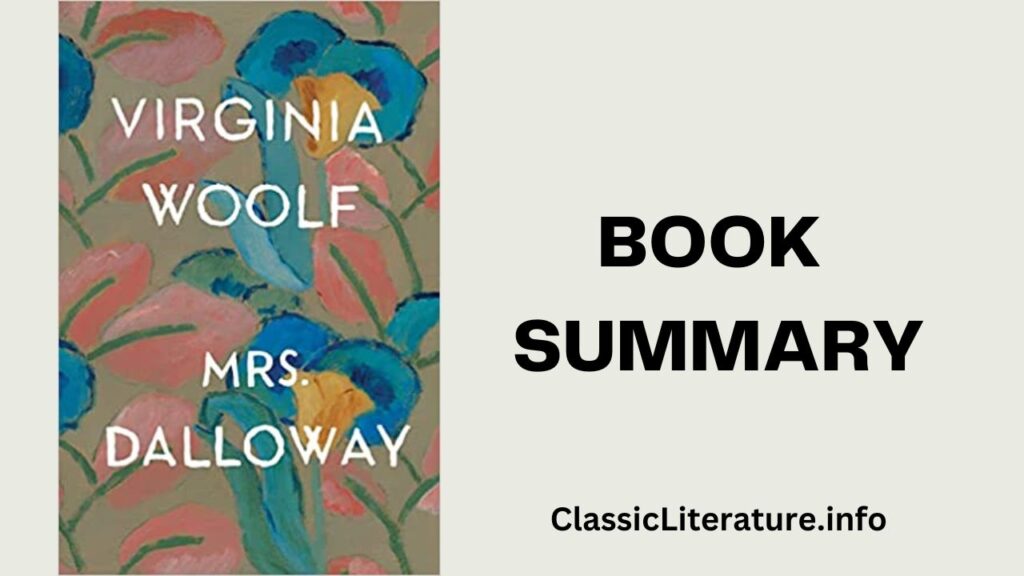
“Mrs. Dalloway” by Virginia Woolf: An Intimate Exploration of Life and Consciousness
“Mrs. Dalloway” by Virginia Woolf is a groundbreaking novel published in 1925 that takes place over the course of a single day in the life of Clarissa Dalloway, a high-society woman in post-World War I London. The book is known for its innovative narrative technique and its exploration of the inner lives and consciousness of its characters.
The main plot follows Clarissa Dalloway as she prepares for a party she is hosting in the evening. As she goes about her day, various events and encounters trigger memories and reflections on her past, her choices, and the complexities of her social roles. The narrative also shifts to other characters, including Peter Walsh, a former suitor of Clarissa’s, and Septimus Warren Smith, a war veteran grappling with post-traumatic stress disorder. Through their interconnected stories, Woolf weaves a tapestry of thoughts, emotions, and societal observations.
Woolf’s writing style in “Mrs. Dalloway” is characterized by its stream-of-consciousness technique, where the thoughts and perceptions of the characters flow freely and seamlessly. This technique allows the reader to delve deep into the inner workings of the characters’ minds, revealing their fears, desires, and insecurities. Woolf’s prose is poetic and lyrical, often employing vivid imagery and sensory details to evoke the characters’ experiences and the atmosphere of post-war London.
Here are some notable quotes from “Mrs. Dalloway” that showcase Woolf’s distinctive writing style and the themes explored in the novel:
- “She had the perpetual sense, as she watched the taxi cabs, of being out, out, far out to sea and alone; she always had the feeling that it was very, very dangerous to live even one day.” This quote captures the existential undertones of the novel and the characters’ constant awareness of the precariousness of life.
- “Fear no more, says the heart, committing its burden to some sea, which sighs collectively for all sorrows, and renews, begins, collects, lets fall.” Woolf’s poetic language and introspective exploration of emotions are evident in this quote, which reflects on the transient nature of human experiences and the solace found in shared sorrows.
- “There was a dignity in people; a solitude; even between husband and wife, a gulf; and that one must respect, thought Clarissa, watching him open the door.” This quote touches upon the theme of loneliness and the inherent distance between individuals, despite their close relationships.
Get Paperback or Kindle version of the book <–
“Mrs. Dalloway” is a must-read for lovers of literary fiction and those interested in the complexities of human consciousness and the portrayal of inner lives. The novel invites readers to contemplate the nature of identity, societal expectations, and the passage of time.
Let’s now explore the perspectives of real readers who have experienced “Mrs. Dalloway”:
Review by Jennifer:
“Virginia Woolf’s ‘Mrs. Dalloway’ is a literary masterpiece that immerses you in the minds and hearts of its characters. The stream-of-consciousness narrative style captures the fleeting thoughts and emotions of the characters, creating a deeply intimate reading experience. Woolf’s ability to explore the complexities of human existence and the nuances of social interactions is awe-inspiring. It’s a novel that lingers in your thoughts and provokes self-reflection.”
Review by Mark:
“‘Mrs. Dalloway’ is a beautifully written novel that transports you to a specific time and place while delving into universal themes. The poetic prose and the vivid imagery bring the characters and their world to life. Although it requires patience to navigate the shifting perspectives, the reward is a profound understanding of the human condition. Woolf’s exploration of identity and the role of society resonates deeply, making this book a true gem of modernist literature.”
Review by Sarah:
“I found ‘Mrs. Dalloway’ to be a challenging but rewarding read. The fragmented narrative style took some getting used to, but it allowed me to intimately connect with the characters and their inner struggles. The novel provides a fascinating commentary on the social expectations placed on women and the constraints of societal norms. While it may not be a book for everyone, I highly recommend it to those who appreciate literary experimentation and deep psychological exploration.”
In conclusion, “Mrs. Dalloway” by Virginia Woolf is a captivating and introspective novel that delves into the complexities of human consciousness and societal expectations. With its poetic prose, stream-of-consciousness narrative, and profound exploration of identity, the book appeals to readers who appreciate literary innovation and a deep dive into the human psyche.
About the Author:
Virginia Woolf (1882-1941) was a British writer and one of the most influential figures of the modernist literary movement. She is known for her experimental narrative techniques and her exploration of feminist themes. Woolf’s works, including “Mrs. Dalloway,” “To the Lighthouse,” and “A Room of One’s Own,” continue to be celebrated for their insightful portrayal of human psychology and their contributions to the evolution of literary form. Woolf’s literary legacy has left an indelible mark on 20th-century literature, inspiring subsequent generations of writers and readers alike.





